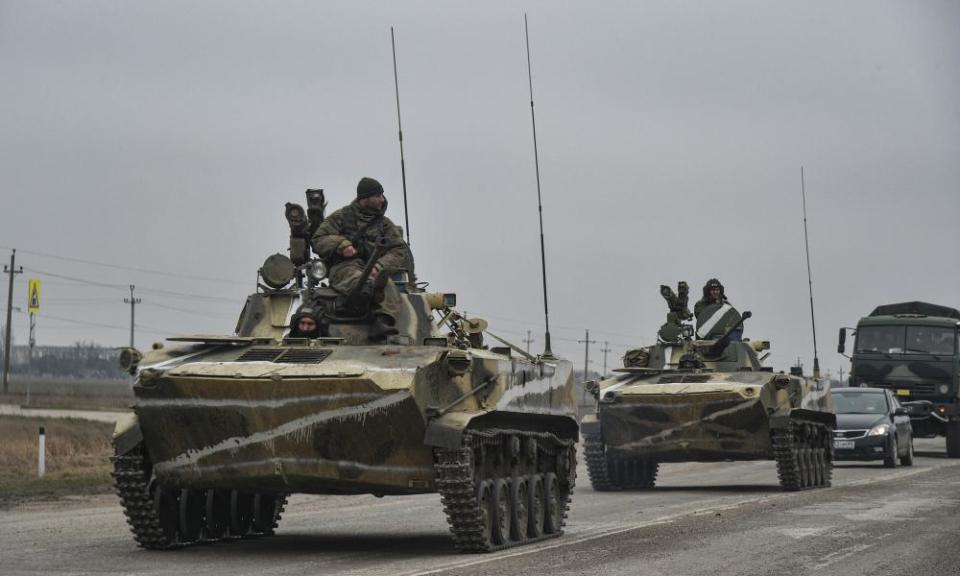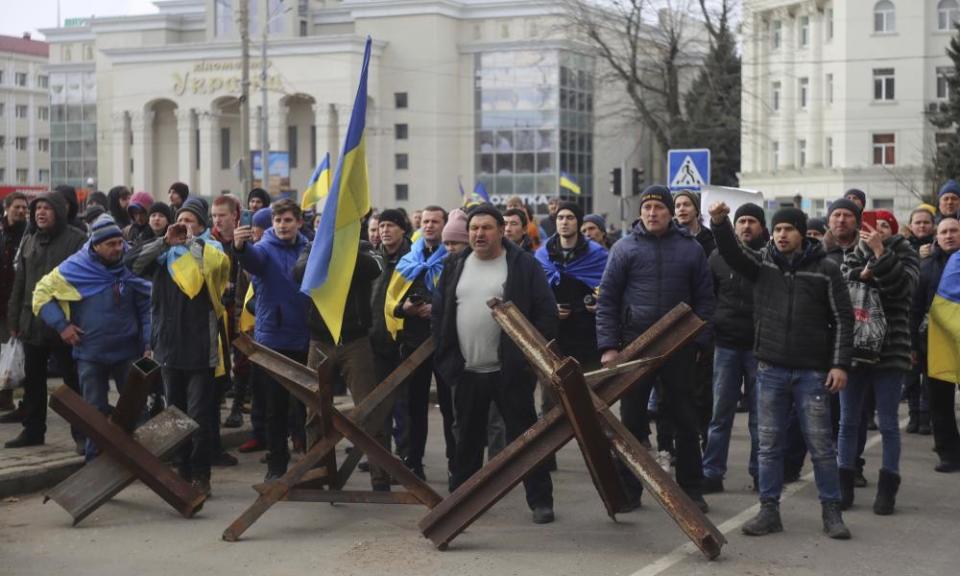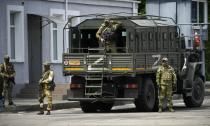‘I don’t see justice in this war’: Russian soldier exposes rot at core of Ukraine invasion
Pavel Filatyev knew the consequences of what he was saying. The ex-paratrooper understood he was risking prison, that he would be called a traitor and would be shunned by his former comrades-in-arms. His own mother had urged him to flee Russia while he still could. He said it anyway.
“I don’t see justice in this war. I don’t see truth here,” he said over a tucked-away cafe table in the Moscow financial district. It was his first time sitting down in person with a journalist since returning from the war in Ukraine.
“I am not afraid to fight in war. But I need to feel justice, to understand that what I’m doing is right. And I believe that this is all failing not only because the government has stolen everything, but because we, Russians, don’t feel that what we are doing is right.”
Two weeks ago, Filatyev went on to his VKontakte social media page and published a 141-page bombshell: a day-by-day description of how his paratrooper unit was sent to mainland Ukraine from Crimea, entered Kherson and captured the seaport, and dug in under heavy artillery fire for more than a month near Mykolaiv – and then how he eventually was wounded and evacuated from the conflict with an eye infection.
By then, he was convinced he had to expose the rot at the core of the Russian invasion of Ukraine. “We were sitting under artillery fire by Mykolaiv,” he said. “At that point I already thought that we’re just out here doing bullshit, what the fuck do we need this war for? And I really had this thought: ‘God, if I survive, then I’ll do everything that I can to stop this.’”
He spent 45 days writing his memoirs from the conflict, breaking an omerta under which even the word war has been banished in public. “I simply can’t stay quiet any longer, even though I know that I probably won’t change anything, and maybe I’ve acted foolishly to get myself in so much trouble,” says Filatyev, his fingers shaking from stress as he lit another cigarette.
His memoir, ZOV, is named for the tactical markings painted on Russian army vehicles that have been adopted as a pro-war symbol in Russia. Until now, there has been no more detailed, voluntary account from a Russian soldier participating in the invasion of Ukraine. Extracts were published in Russia’s independent press, while Filatyev appeared via video for a televised interview on TV Rain.

“It’s very important that someone became the first to speak out,” said Vladimir Osechkin, the head of the human rights network Gulagu.net, who helped Filatyev leave Russia earlier this week. That also made Filatyev the first soldier known to have fled Russia due to opposition to the war. “And it’s opening a Pandora’s box.”
This week the Russian investigative site iStories, which Russia has been banned from the country, has published a confession from another Russian soldier admitting on camera to shooting and killing a civilian resident in the Ukrainian city of Andriivka.
Most people in the army are unhappy about what’s going on there
Filatyev, who served in the 56th Guards air assault regiment based in Crimea, described how his exhausted and poorly equipped unit stormed into mainland Ukraine behind a hail of rocket fire in late February, with little in terms of concrete logistics or objectives, and no idea why the war was taking place at all. “It took me weeks to understand there was no war on Russian territory at all, and that we had just attacked Ukraine,” he said.
At one point, Filatyev describes how the ravenous paratroopers, the elite of the Russian army, captured the Kherson seaport and immediately began grabbing “computers and whatever valuable goods we could find”. Then they ransacked the kitchens for food.
“Like savages, we ate everything there: oats, porridge, jam, honey, coffee … We didn’t give a damn about anything, we’d already been pushed to the limit. Most had spent a month in the fields with no hint of comfort, a shower or normal food.
“What a wild state you can drive people to by not giving any thought to the fact that they need to sleep, eat and wash,” he wrote. “Everything around gave us a vile feeling; like wretches we were just trying to survive.”

Filatyev took a deep drag from a cigarette as he recounted the story, nervously looking around for anyone watching him at close to midnight in a Moscow park, then tries to explain.
“I know it will sound savage to a foreign reader,” he said, describing a fellow soldier stealing a computer. “But [the soldier] knows that this is worth more than one of his salaries. And who knows if he’ll be alive tomorrow anyway. So he takes it. I’m not trying to justify what he’s done. But I think it’s important to say why people act like this, to understand how to stop them … What a person will do in these kinds of extreme situations.”
He railed at length against what he called the “degradation” of the army, including the use of dated kit and vehicles that left Russian soldiers exposed to Ukrainian counterattacks. The rifle he was given before the war was rusted and had a broken strap, he said.
“We were just an ideal target,” he wrote, describing travelling to Kherson on obsolete and unarmoured UAZ trucks that sometimes stood in place for 20 minutes. “It was unclear what the plan was – as always no one knew anything.”

Filatyev describes his unit, as the war dragged on, being pinned down in trenches for nearly a month near Mykolaiv under Ukrainian artillery fire. It was there that a shell blasted mud into his eye, leading to an infection that nearly blinded him.
As frustrations grew on the front, he wrote about reports of soldiers deliberately shooting themselves in order to escape the front and collect 3 million roubles (£40,542) in compensation, as well as rumours of acts of mutilation against captured soldiers and corpses.
In the interview, he said he had not personally seen the acts of abuse carried out during the war. But he described a culture of anger and resentment in the army that tears down the facade of total support for the war portrayed in Russian propaganda.
“Most people in the army are unhappy about what’s going on there, they’re unhappy about the government and their commanders, they’re unhappy with Putin and his politics, they’re unhappy with the minister of defence, who has never served in the army,” he wrote.
Since going public, he said, his entire unit has cut contact with him. But he believed that 20% of them supported his protest outright. And many others, in quiet conversations, had told him about a grudging sense of respect for the patriotism of Ukrainians fighting to defend their own territory. Or had complained about mistreatment by Russia of its own soldiers.
“No one is treating veterans here,” he said at one point. In military hospitals, he described meeting disgruntled soldiers, including wounded sailors from the Moskva cruiser, sunk by Ukrainian missiles in April, shouting a senior officer out of the room. And, in ZOV, he claimed that “there are heaps of dead, whose relatives have not been paid compensation”, corroborating media reports of wounded soldiers waiting months for payouts.
Filatyev’s original plan was to publish his memoir and immediately turn himself in to the police. But Osechkin, the activist, told him to reconsider while urging him repeatedly to flee the country. Until this week, he had refused to do so.
“So I leave, I go to America, and who am I there? What am I supposed to do?” he said. “If I’m not even needed in my own country, then who needs me there?”
That was why, for two weeks, Filatyev had been staying in a different hotel every night and living out of a heavy black knapsack he carried with him, trying to stay one step ahead of the police. Even then, he admits, he should not have been hard to find.
The Guardian has not been able to independently verify all the details of Filatyev’s story, but he has supplied documents and photographs showing he was a paratrooper with the 56th airborne regiment stationed in Crimea, that he was hospitalised with an eye injury sustained while “performing special tasks in Ukraine” in April and that he had written directly to the Kremlin with his complaints about the war before going public.
Old photographs show Filatyev as a teenager in a blue-and-white telnyashka (the traditional blue and white undershirt worn by military personnel) among his fellow soldiers, then hanging from a carousel during paratrooper training, then, already older, clean-shaven in tan camouflage posing with a rifle in Crimea before the war began.
Born into a military family in the southern city of Volgodonsk, Filatyev, 34, spent much of his early 20s in the army. After serving in Chechnya in the late 2000s, he spent nearly a decade as a horse trainer, working for the Russian meat-producing company Miratorg and wealthy clients before reenlisting in 2021 for financial reasons, he said.
Now he is a changed man. He remains powerfully built and articulate, but war and stress have taken their toll. His scarred cheeks are covered by a two-week old stubble. He still can’t see properly out of his right eye. And he laughs bitterly at having to complain about the Russian army to a foreign journalist and “coming to talk to you like a priest over beers”.
“They say that the heroism of some is the fault of others,” he said. “It’s the 21st century, we started this idiotic war, and once again we’re calling on soldiers to carry out heroic deeds, to sacrifice themselves. What’s the problem – are we not dying out at it is?”
Most of all, he wondered why he was still free. He had heard that his unit was preparing to charge him with desertion, an accusation that could land him in prison for many years. And yet nothing happened.
“I don’t understand why they still haven’t snatched me up,” he says upon meeting at a train station in Moscow. “I’ve said more than anyone has for the last six months. Maybe they don’t know what to do with me.”
I am just terrified of what happens next
It is a mystery he may never solve. Filatyev fled the country via an undisclosed route sometime after Saturday evening, when he headed off to find a hostel to spend the night. Two days later, Osechkin announced Filatyev had managed to escape Russia “before his arrest”. It is still unclear whether or not he has been charged formally with any crime in Russia.
“Why should I have to flee my country just for telling the truth about what these bastards have turned our army into,” Filatyev wrote in a Telegram message. “I am overwhelmed by emotions that I have had to leave my country.”
He remains one of just a handful of Russian soldiers to have spoken out publicly about the war, albeit after months of agonising about how to do so without violating his service. “People ask me why I didn’t throw down my weapon,” he said. “Well I’m against this war, but I’m not a general, I’m not the defence minister, I’m not Putin – I don’t know how to stop this. I wouldn’t have changed anything to become a coward, and throw down my weapon and abandon my comrades.”
Sitting along the busy streets of Moscow for possibly the last time, he said he hoped this would all come to an end after popular protests like during the Vietnam war. But for now, he said, that seemed far off.
“I am just terrified of what happens next,” he said, imagining Russia fighting for total victory despite the terrible cost. “What will we pay for that? Who will be left in our country? ... For myself I said that this is a personal tragedy. Because what have we become? And how can it get any worse?”







